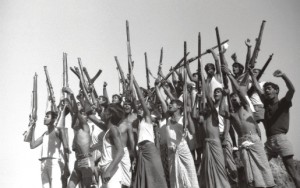|
Remembrance
 |
M R Akhtar Mukul |
M R Akhtar Mukul
our raconteur, our historian
Syed Badrul Ahsan
It is time to remember M R Akhtar Mukul. And we remember because of the waves he caused in our lives, back in the weeks and months of medieval darkness we lived through in occupied Bangladesh when the soldiers of the Pakistan army went around burning, raping, pillaging and killing in the name of national solidarity. Mukul was part of that band of brothers who believed that the dignity of the Bengali was under assault. And because it was, it was of absolute importance that it be restored through a spirited resistance to the enemy. His was a story forged on the anvil of time, just as the tales of all our war heroes were shaped through the searing battles of a war we had never imagined would come our way.
It was a beautiful, cruel war we all went to. There were those who organised a government, the first such move in the annals of Bengali history; there were the men who devised war strategy; there were the poets, artistes, young men and young women who rekindled tradition as they journeyed through the darkness of the monsoon rains, to sing of the victory that was about to be. And then there was Shwadhin Bangla Kendra, that mighty outpost the enemy could not spot and therefore could not dismantle. It gave us, through the gathering gale force of a marching Mukti Bahini, the voice of Bangabandhu that was a reminder of the man behind it all. It mocked the Pakistanis through the inimitable script of Jollader Dorbar. And it offered us, every evening, or nearly every evening, Mukul in his coruscating element.
In Charampatra came alive the resilience of the Bengali and the naivete of the Pakistan army. It was a humour skit served up to Bengalis in internal exile in their own bloodied land as also to those who sought to free it through waging war against the enemy. And yet the humour came in huge doses of sarcasm and powerful dashes of history. Chhokku Mia, he of Old Dhaka, was the quintessential we, the symbolic representation of a Bengali unwilling to yield, reluctant to give the enemy even an inch of his verdant land. There were, in Chhokku Mia, all the traces of behaviour, all the manners and mannerisms that endeared him to his fellow Bengalis, indeed held him up as a Bengali typified by history. He was aware of history, he understood the trauma Bangladesh was going through, and he knew that with their poor grasp of the truth, the Pakistanis could only end up biting the dust in Bangladesh. It was Chhokku Mia. Or it was Mukul himself. Whatever it was, whoever it was, it buoyed the spirit of the Bengalis and kept it aloft right through to the end of the war. On 16 December Chhokku Mia came home. All of us came home. Mukul was deservedly a man in heroic mould.
 We recall Mukul for the Swiftian assault he made on the occupation forces in 1971. And we recall him as well for the scholar that he revealed himself to be after the war. Like millions of us, he was deeply scarred by the regression Bangladesh went through in the years after August 1975. Again, like millions of us, he reminded himself of the historical need for a reassertion of history. Unlike millions of us, he went into a reconstruction of that history --- word by word, page by page, thought by thought --- and would not stop until there were the magnificent volumes that came our way. It was the tale of liberation he recounted, along with the stories of our heroes. Against all odds, he never let us forget through the darkness of dictatorship of the giant leaps Bangabandhu had taken us through. Among the very few not unwilling to speak up for truth and justice, Mukul remembered the valiant soldier that Khaled Musharraf had been. We remembered with him. We recall Mukul for the Swiftian assault he made on the occupation forces in 1971. And we recall him as well for the scholar that he revealed himself to be after the war. Like millions of us, he was deeply scarred by the regression Bangladesh went through in the years after August 1975. Again, like millions of us, he reminded himself of the historical need for a reassertion of history. Unlike millions of us, he went into a reconstruction of that history --- word by word, page by page, thought by thought --- and would not stop until there were the magnificent volumes that came our way. It was the tale of liberation he recounted, along with the stories of our heroes. Against all odds, he never let us forget through the darkness of dictatorship of the giant leaps Bangabandhu had taken us through. Among the very few not unwilling to speak up for truth and justice, Mukul remembered the valiant soldier that Khaled Musharraf had been. We remembered with him.
All these moons after his passing, with so many monsoons having blown through our collective existence, we miss the essential man that was M.R. Akhtar Mukul. He was part of our history, one we trusted to keep our heritage going. He was the raconteur whose storytelling, interspersed with the electric energy he brought into it, led us, ever so gently, into a new search for our roots.
Mukul played the flute. We cheerfully sang the songs he had composed as history.
(M R Akhtar Mukul died on June 26, 2004)
Copyright
(R) thedailystar.net 2010
|

